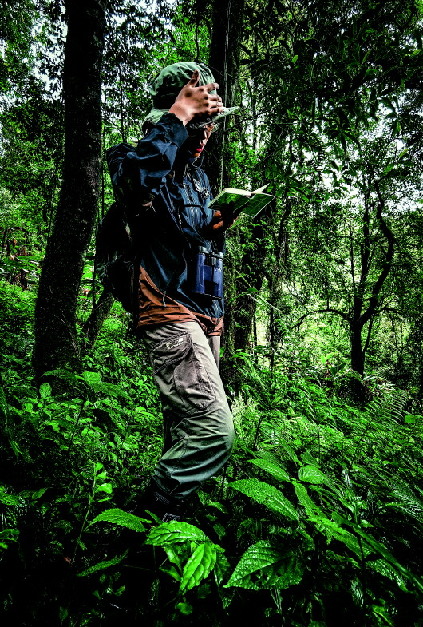

Getting up at 4 a.m., starting off at 5:30 a.m. from the base at an altitude of 2,300 meters, walking on soft soil into the depths of the Gaoligong Mountain of southwest China's Yunnan province along the lush vegetation, coming to the tree where skywalker hoolock gibbons have spent the night and starting a whole day of "keeping watch"... This is the daily life of Beijing girl Zhu Changyue over the past two years.

Zhu Changyue (Photo provided by Yunshanbaohu)
Zhu's work includes observing the movements of close relatives of humans, that is, an endangered animal called skywalker hoolock gibbons: what do they eat, who has shaved whom, and when do they "poop,” following with the processing of samples of the feces for data collection.
During her spare time, Zhu has no time to browse mobile phones or watch TV. At the base, network signals and electricity are almost extravagant resources. When night falls, there are no urban neon lights in the mountains, only the black eyes of squirrels in the trees, as if they are a pair of night lights to remind the people living under the trees to go to bed and get up early tomorrow.
Going back to two years ago, Zhu’s life was different. She used to get up at 6 o'clock in the morning, take the bus to catch the subway, merge into the flow of people in the morning rush hour in Beijing, and arrive at her workplace around 8 o'clock, devoted to her day's work. Usually getting off work at 5 p.m., it was common for Zhu to work overtime consulting materials or translating literature.
In October 2018, Zhu quit her job at the Paleozoological Museum of China, boarded a flight to Yunnan, and changed into military green camouflage clothes and walking shoes often worn by forest rangers. From then on, she has begun her career of protecting gibbons in the wild.
"Skywalker hoolock gibbons are even rarer than giant pandas, and there are even fewer people studying and protecting them."
Due to low public awareness, the conservation of gibbon species has not received enough attention for a long time. However, Zhu and her colleagues chose to embark on a tough journey, as the paths of their daily work related to gibbons is as difficult as the way into the mountains, which is not adequately prepared for humans.
A week after joining the team in March this year, Fan Fan, a colleague of Zhu, conducted a vacancy survey at the project site in the Menglian mountains, Pu'er, Yunnan province along with Zhu and another colleague, using field recording equipment to search for news of white-handed gibbons.
Scholars widely believe that white-handed gibbons have become extinct in the wild in China, but Zhu and her colleagues refused to give up. "We don't want white-handed gibbons to be misjudged as extinct just because we didn't carry out a thorough investigation," Zhu said.
"I have always believed that there are two important factors in what you choose to do in your youth, in addition to having smart and interesting people around you, you have to be able to make important decisions and be responsible for them," Zhu revealed, adding that for her, one of the "important decisions" she made was to leave her former workplace and strive alongside like-minded young people at the Gaoligong Mountain, far away from a "protective net.”
 Fire brigade in Shanghai holds group wedding
Fire brigade in Shanghai holds group wedding Tourists enjoy ice sculptures in Datan Town, north China
Tourists enjoy ice sculptures in Datan Town, north China Sunset scenery of Dayan Pagoda in Xi'an
Sunset scenery of Dayan Pagoda in Xi'an Tourists have fun at scenic spot in Nanlong Town, NW China
Tourists have fun at scenic spot in Nanlong Town, NW China Harbin attracts tourists by making best use of ice in winter
Harbin attracts tourists by making best use of ice in winter In pics: FIS Alpine Ski Women's World Cup Slalom
In pics: FIS Alpine Ski Women's World Cup Slalom Black-necked cranes rest at reservoir in Lhunzhub County, Lhasa
Black-necked cranes rest at reservoir in Lhunzhub County, Lhasa China's FAST telescope will be available to foreign scientists in April
China's FAST telescope will be available to foreign scientists in April "She power" plays indispensable role in poverty alleviation
"She power" plays indispensable role in poverty alleviation Top 10 world news events of People's Daily in 2020
Top 10 world news events of People's Daily in 2020 Top 10 China news events of People's Daily in 2020
Top 10 China news events of People's Daily in 2020 Top 10 media buzzwords of 2020
Top 10 media buzzwords of 2020 Year-ender:10 major tourism stories of 2020
Year-ender:10 major tourism stories of 2020 No interference in Venezuelan issues
No interference in Venezuelan issues
 Biz prepares for trade spat
Biz prepares for trade spat
 Broadcasting Continent
Broadcasting Continent Australia wins Chinese CEOs as US loses
Australia wins Chinese CEOs as US loses